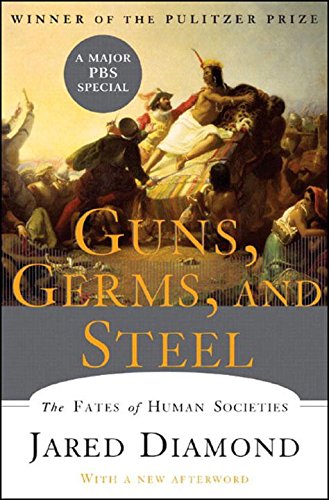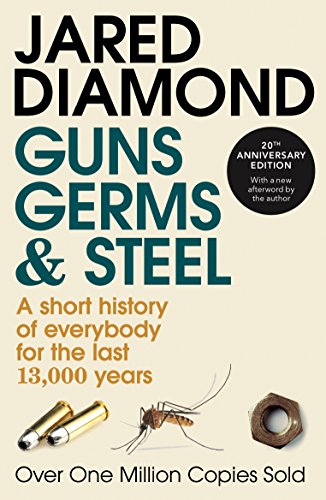-
Guns, Germs and Steel: The Fate of Human Societies
Jared Diamond, Doug Ordunio, Random House Audio
Audible Audiobook (Random House Audio, Jan. 18, 2011)Pulitzer Prize, General Nonfiction, 1998 Guns, Germs and Steel examines the rise of civilization and the issues its development has raised throughout history. Having done field work in New Guinea for more than 30 years, Jared Diamond presents the geographical and ecological factors that have shaped the modern world. From the viewpoint of an evolutionary biologist, he highlights the broadest movements both literal and conceptual on every continent since the Ice Age, and examines societal advances such as writing, religion, government, and technology. Diamond also dissects racial theories of global history, and the resulting work-Guns, Germs and Steel-is a major contribution to our understanding the evolution of human societies.
-
Guns, Germs, and Steel: The Fates of Human Societies
Jared Diamond Ph.D.
Paperback (W. W. Norton & Company, March 7, 2017)"Fascinating.... Lays a foundation for understanding human history."―Bill Gates In this "artful, informative, and delightful" (William H. McNeill, New York Review of Books) book, Jared Diamond convincingly argues that geographical and environmental factors shaped the modern world. Societies that had had a head start in food production advanced beyond the hunter-gatherer stage, and then developed religion --as well as nasty germs and potent weapons of war --and adventured on sea and land to conquer and decimate preliterate cultures. A major advance in our understanding of human societies, Guns, Germs, and Steel chronicles the way that the modern world came to be and stunningly dismantles racially based theories of human history. Winner of the Pulitzer Prize, the Phi Beta Kappa Award in Science, the Rhone-Poulenc Prize, and the Commonwealth club of California's Gold Medal.
-
Guns, Germs, and Steel: The Fates of Human Societies
Jared Diamond
eBook (W. W. Norton & Company, March 7, 2017)"Fascinating.... Lays a foundation for understanding human history."—Bill GatesIn this "artful, informative, and delightful" (William H. McNeill, New York Review of Books) book, Jared Diamond convincingly argues that geographical and environmental factors shaped the modern world. Societies that had had a head start in food production advanced beyond the hunter-gatherer stage, and then developed religion --as well as nasty germs and potent weapons of war --and adventured on sea and land to conquer and decimate preliterate cultures. A major advance in our understanding of human societies, Guns, Germs, and Steel chronicles the way that the modern world came to be and stunningly dismantles racially based theories of human history. Winner of the Pulitzer Prize, the Phi Beta Kappa Award in Science, the Rhone-Poulenc Prize, and the Commonwealth club of California's Gold Medal.
-
Guns, Germs, and Steel: The Fates of Human Societies
Jared Diamond Ph.D.
Hardcover (W. W. Norton & Company, July 17, 2005)"Fascinating.... Lays a foundation for understanding human history."―Bill Gates Winner of the Pulitzer Prize, Guns, Germs, and Steel is a brilliant work answering the question of why the peoples of certain continents succeeded in invading other continents and conquering or displacing their peoples. This edition includes a new chapter on Japan and all-new illustrations drawn from the television series. Until around 11,000 BC, all peoples were still Stone Age hunter/gatherers. At that point, a great divide occurred in the rates that human societies evolved. In Eurasia, parts of the Americas, and Africa, farming became the prevailing mode of existence when indigenous wild plants and animals were domesticated by prehistoric planters and herders. As Jared Diamond vividly reveals, the very people who gained a head start in producing food would collide with preliterate cultures, shaping the modern world through conquest, displacement, and genocide.The paths that lead from scattered centers of food to broad bands of settlement had a great deal to do with climate and geography. But how did differences in societies arise? Why weren't native Australians, Americans, or Africans the ones to colonize Europe? Diamond dismantles pernicious racial theories tracing societal differences to biological differences. He assembles convincing evidence linking germs to domestication of animals, germs that Eurasians then spread in epidemic proportions in their voyages of discovery. In its sweep, Guns, Germs and Steel encompasses the rise of agriculture, technology, writing, government, and religion, providing a unifying theory of human history as intriguing as the histories of dinosaurs and glaciers. 32 illustrations
-
Guns, Germs, and Steel: The Fates of Human Societies
Jared M. Diamond
Paperback (W. W. Norton & Company, April 1, 1999)"Fascinating.... Lays a foundation for understanding human history."―Bill Gates In this "artful, informative, and delightful" (William H. McNeill, New York Review of Books) book, Jared Diamond convincingly argues that geographical and environmental factors shaped the modern world. Societies that had had a head start in food production advanced beyond the hunter-gatherer stage, and then developed religion --as well as nasty germs and potent weapons of war --and adventured on sea and land to conquer and decimate preliterate cultures. A major advance in our understanding of human societies, Guns, Germs, and Steel chronicles the way that the modern world came to be and stunningly dismantles racially based theories of human history. Winner of the Pulitzer Prize, the Phi Beta Kappa Award in Science, the Rhone-Poulenc Prize, and the Commonwealth club of California's Gold Medal.
-
Guns, Germs, and Steel: The Fates of Human Societies
Jared Diamond, Doug Ordunio
Audio CD (Random House Audio, June 7, 2011)Why did Eurasians conquer, displace, or decimate Native Americans, Australians, and Africans, instead of the reverse? Evolutionary biologist Jared Diamond stunningly dismantles racially based theories of human history by revealing the environmental factors actually responsible for history’s broadest patterns. The story begins 13,000 years ago, when Stone Age hunter-gatherers constituted the entire human population. Around that time, the paths of development of human societies on different continents began to diverge greatly. Early domestication of wild plants and animals in the Fertile Crescent, China, Mesoamerica, the Andes, and other areas gave peoples of those regions a head start. Only societies that advanced beyond the hunter-gatherer stage acquired a potential for developing writing, technology, government, and organized religions—as well as those nasty germs and potent weapons of war. It was those societies, that expanded to new homelands at the expense of other peoples. The most familiar examples involve the conquest of non-European peoples by Europeans in the last 500 years, beginning with voyages in search of precious metals and spices, and often leading to invasion of native lands and decimation of native inhabitants.
-
Guns, Germs and Steel: The Fates of Human Societies
Jared Diamond
Hardcover (W W Norton & Co Inc, March 1, 1997)An intriguing study of the rise of civilization argues that human development is not based on race or ethnic differences but rather is linked to biological diversity, discussing the evolution of agriculture, technology, writing, political systems, and religious belief. Tour.
-
GUNS, GERMS AND STEEL - A Short History of Everybody for the Last 13,000 Years
Jared Diamond
Paperback (W.W. Norton, March 15, 1998)Winner of the 1998 Rhone-Poulenc Science Book Prize. Purchased in Europe and was published in the UK. The book answers the most obvious,mthe most important question about human history - why history unfolded so differently on the different continents. NATURE called it "One of the most important readable works on the human past." Great book for anyone interested in popular science.
-
Guns, Germs, and Steel: The Fates of Human Societies 1st edition by Diamond, Jared
Jared Diamond;
Hardcover (W. W. Norton & Company, March 15, 1656)Will be shipped from US. Used books may not include companion materials, may have some shelf wear, may contain highlighting/notes, may not include CDs or access codes. 100% money back guarantee.
-
Guns, Germs, and Steel: The Fates of Human Societies by Jared M. Diamond
Jared Diamond, Illus. with photos
Paperback (W.W. Norton, March 15, 1999)"A brilliantly written, passionate, whirlwind tour through 13,000 years of history on all the continents. A scope of world history in less than 500 pages". (from back book cover)
-
Guns, Germs and Steel: The Fates of Human Societies
Jared Diamond, Grover Gardner
Audio CD (HighBridge Audio, July 11, 2001)Winner of the Pulitzer PrizeIn this groundbreaking work, evolutionary biologist Jared Diamond stunningly dismantles racially based theories of human history by revealing the environmental factors actually responsible for history's broadest patterns. It is a story that spans 13,000 years of human history, beginning when Stone Age hunter-gatherers constituted the entire human population. Guns, Germs, and Steel is a world history that really is a history of all the world's peoples, a unified narrative of human life.
-
Guns, Germs, and Steel: The Fates of Human Societies by Diamond, Jared 1st
Jared Diamond
Hardcover (W. W. Norton & Company, March 15, 2006)Excellent Book